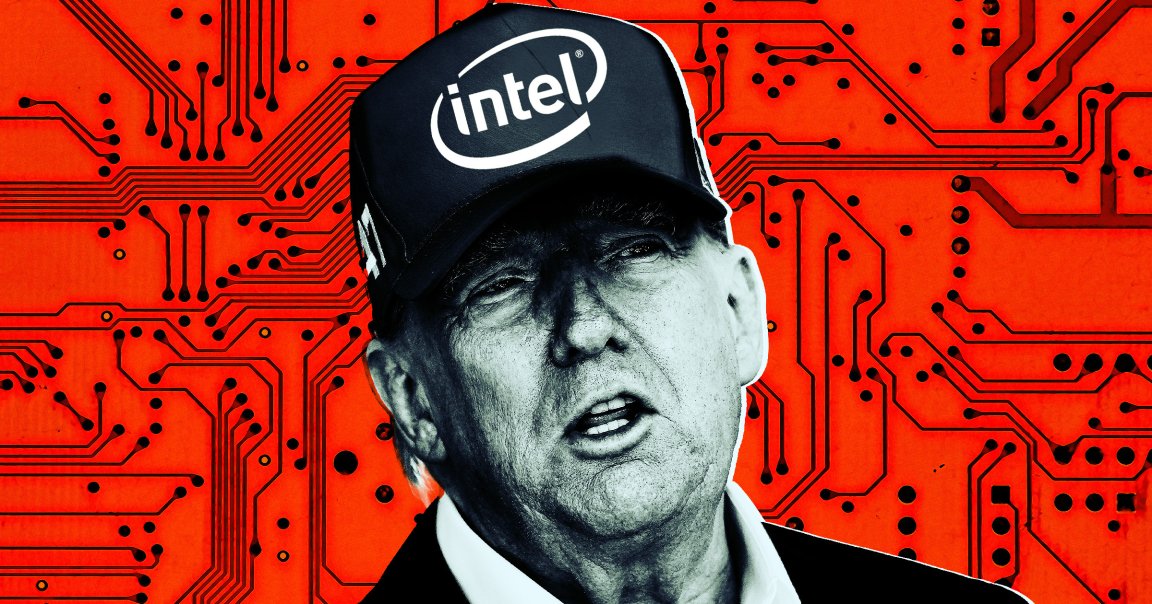
Politicians can end up with strange bedfellows in this chaotic age, but certain economic tenets are virtually incontrovertible: calls to nationalize industry typically come from the left, while the right steadfastly opposes those efforts in favor of market-based solutions.
And yet, for some reason, the ever-chaotic president Donald Trump has directed the US government to acquire a 10 percent stake in the troubled chipmaker Intel — a bizarre and impractical move that’s being decried across the ideological spectrum.
In a press release, the once-dominant chipmaker announced that the US government is purchasing $8.9 billion in company stock to “support the continued expansion of American technology and manufacturing leadership.”
“As more companies look to invest in America, this administration remains committed to reinforcing our country’s dominance in artificial intelligence while strengthening our national security,” US commerce secretary Howard Lutnick said in the same statement.
To state the obvious, Intel is not currently a winning bet. Its semiconductors were in great demand for decades — remember those “Intel Inside” stickers on personal computers sporting Pentium processors? — but heading into the age of AI, it’s lost a staggering amount of ground to the upstart chipmaker Nvidia, which has captured the market with hardware specifically designed to train and operate cutting-edge machine learning algorithms at incredible scale, consequently overtaking Intel’s revenue many times over.
Though it represented Silicon Valley ingenuity for many years, as the Motley Fool noted at the beginning of this year, Intel stock dropped 60 percent in 2024 alone, falling below $20 by late December. That’s a particularly stunning fall from grace if you zoom out, with its share price pushing $70 back in 2021 before years of decline. (Its stock price lurched around a bit after the Trump news, but ultimately fell about a percentage point over the course of Monday.)
The contrast to Nvidia’s financial situation is astonishing; over that same period that Intel is down so much since 2021 or so, Nvidia’s share price is up more than 1,000 percent.
As bad a financial move as the investment may be, the really baffling thing is that Trump is effectively nationalizing Intel — a hallmark of the very same socialist ideologies he professes to loathe when attacking Rep. Alexandria Ocasio-Cortez and, more recently, New York City mayoral candidate Zohran Mamdani.
One thing’s for sure: the move — which Trump spun as an “art of the deal”-style exchange in which he offered to buy 10 percent of Intel instead of demanding its CEO be fired — is causing friction with fellow Republicans.
In a video posted on X, influential conservative talk radio host Eric Erickson cited Mamdani directly when calling out the Intel investment.
“So many of you were opposed to Mamdani wanting to seize the means of production in New York City, but are totally fine with Trump’s Commerce Secretary wanting the US government to become the largest shareholder of Intel,” Erickson opined. “This is socialism with an R next to its name.”
Sen. Rand Paul expressed similar concerns.
“Today it’s Intel, tomorrow it could be any industry a future Commerce Secretary decides to control,” Paul told Politico after hearing about the deal last week. “If conservatives endorse this now, they hand Democrats a blueprint to expand government ownership over the private sector later. Socialism is literally government control of the means of production.”
Meanwhile, Sen. Bernie Sanders, who caucuses with the Democrats but has referred to himself as a democratic socialist, walked the fine line between praising the Intel stake purchase and criticizing it for not going far enough.
“Taxpayers should not be providing billions of dollars in corporate welfare to large, profitable corporations like Intel without getting anything in return,” Sanders said in a statement. “If microchip companies make a profit from the generous grants they receive from the federal government, the taxpayers of America have a right to a reasonable return on that investment.”
That latter caveat — that average people should get some benefit for footing the nearly $9 billion investment should Intel flourish now that the US government is its largest single stakeholder — marks the distinction between real, socialist-style nationalization of industry and whatever Trump is doing.
Unfortunately, any gains Intel makes relative to Nvidia will be extremely hard-fought, so the American people may find themselves waiting a long time — or perhaps forever — for a solid return on the investment.
Undeterred, Trump immediately pledged to carry out more similar deals.
“People come in and they need something,” he said today. “I hope I’m going to have many more cases like it.”
More on Trump: Trump’s Anti-Science Agenda Is Massively Hampering His Plans for AI, Experts Warn